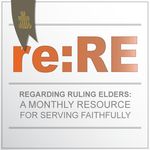During a meeting with colleagues at the Presbyterian Center, we discussed the ordination questions; the questions that all ruling elders, deacons, and teaching elders are asked at the ordinations and installations. The first one is a doozy, “Do you trust in Jesus Christ your Savior, acknowledge him Lord of and Head of the Church, and through him believe in one God, Father, Son, and Holy Spirit?” Of course the answer to this big, big question is, “yes.”
And the third question is, in my experience, the one that many ruling elders have the hardest time getting their heads around because it asks if “you sincerely receive and adopt the essential tenets of the Reformed faith as expressed in the confessions of our church ... ?”
These two questions put together raise a profound point: What does it mean to trust in Jesus Christ, to believe in the God of the scriptures, as Presbyterians? Most of what we believe is common to all Christians. This is expressed in the Book of Order as our convictions of the incarnation of Christ, the truth of the Trinity, and the recognition of the authority of Holy Scripture (F-2.03). And so it is true that when we talk about what is distinctive about being Presbyterian, we don’t want to have too big of an answer—we share basic convictions, a common language with Baptists, Pentecostals, Roman Catholics, Methodists, Mennonites, etc.
But each of these traditions has an accent on that language. We speak the same language as other Christians, but we have a distinctive and important accent on that language. Our accent is grace and gratitude.
Grace and gratitude is our theological and spiritual vision. What is our picture of God? The gracious one who comes to us in creation, in the law, in the prophets, and ultimately in the person of Jesus Christ. The God who sustains us with the ongoing grace of the Holy Spirit. The God who calls us through the church. The God who is for us.
The most profound articulation of this theological and spiritual vision comes from the French baptismal liturgy developed by the Huguenot church in the Reformation:
Little one, for you Jesus Christ came into the world:
for you he lived and showed God’s love;
for you he suffered the darkness of Calvary
and cried at the last, “It is accomplished”;
for you he triumphed over death and rose in newness of life;
for you he ascended to reign at God’s right hand.
All this he did for you, little one,
though you do not know it yet.
And so the word of Scripture is fulfilled:
“We love because God loved us first.” [1]
That is grace.
And what is our only appropriate response? Gratitude. Gratitude for our lives, for our treasure, for our community. Gratitude that compels us to share the love of Christ in the community and to do justice and love mercy for all God’s children. Karl Barth wrote that grace and gratitude “belong together like heaven and earth. Grace evokes gratitude like the voice an echo. Gratitude follows grace like thunder [follows] lightning.” If God is, in essence, grace, then we are, in essence, gratitude.[2]
You can hear grace and gratitude in the last clause in question and answer 86 of the Heidelberg Catechism:
86 Q. Since we have been delivered
from our misery
by grace through Christ
without any merit of our own,
why then should we do good works?
A. Because Christ, having redeemed us by his blood,
is also restoring us by his Spirit into his image,
so that with our whole lives
we may show that we are thankful to God
for his benefits . . .[3]
Grace and gratitude—that’s a short form of what we Presbyterians believe about God in Jesus Christ by the power of the Spirit. When ruling elders practice the answer to the last ordination question, “will you be a faithful ruling elder, watching over the people, providing for their worship, nurture, and service,” it is my hope that they will do so in the service of our common faith in Jesus Christ, but with a Presbyterian accent.
W-4.4003 of the Book of Order includes all of the questions asked at ordination and installation.
Charles Wiley is the coordinator of the Office of Theology and Worship in the Presbyterian Mission Agency. He was clerk of session at Blacknall Memorial Presbyterian in Durham, N.C., for three months before unexpectedly moving to Princeton, N.J., to do a Ph.D. in Theology.
[1] Church of Scotland, Book of Common Order (Edinburgh: St Andrew Press; 2nd edition 1996).
[2] Karl Barth, Church Dogmatics (Edinburgh: T&T Clark, 1960), IV.1.2, §57.
[3] Presbyterian Church (U.S.A.), Book of Confessions (Louisville: Office of the General Assembly, 2016), 4.086.
For more about the information provided here, please contact Martha Miller at martha.miller@pcusa.org and browse the Ruling Elders website.

